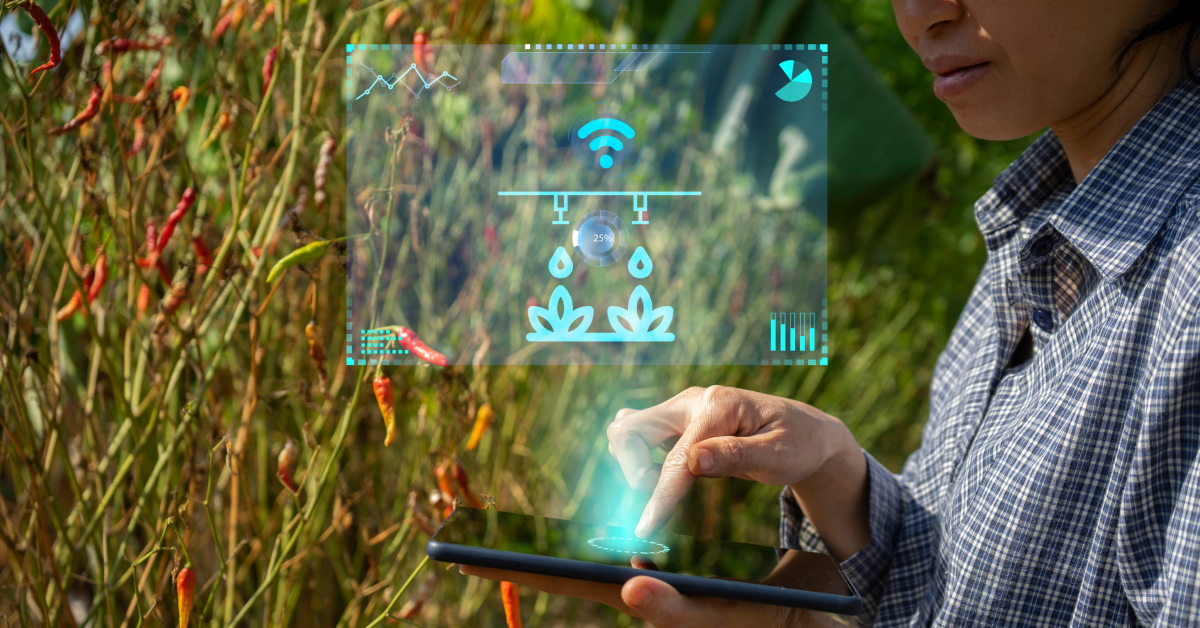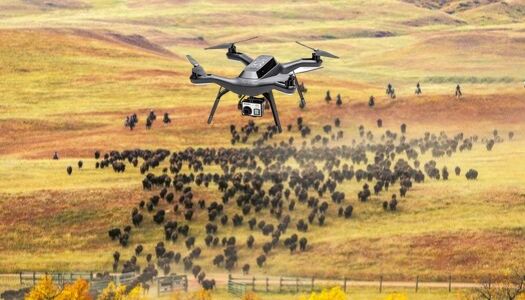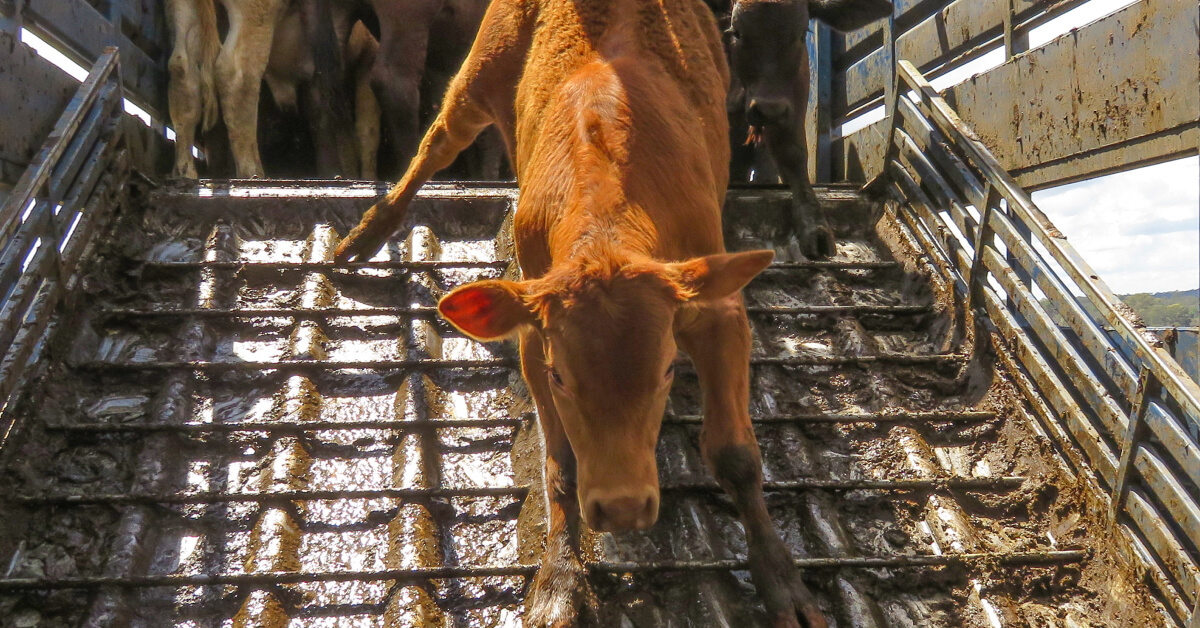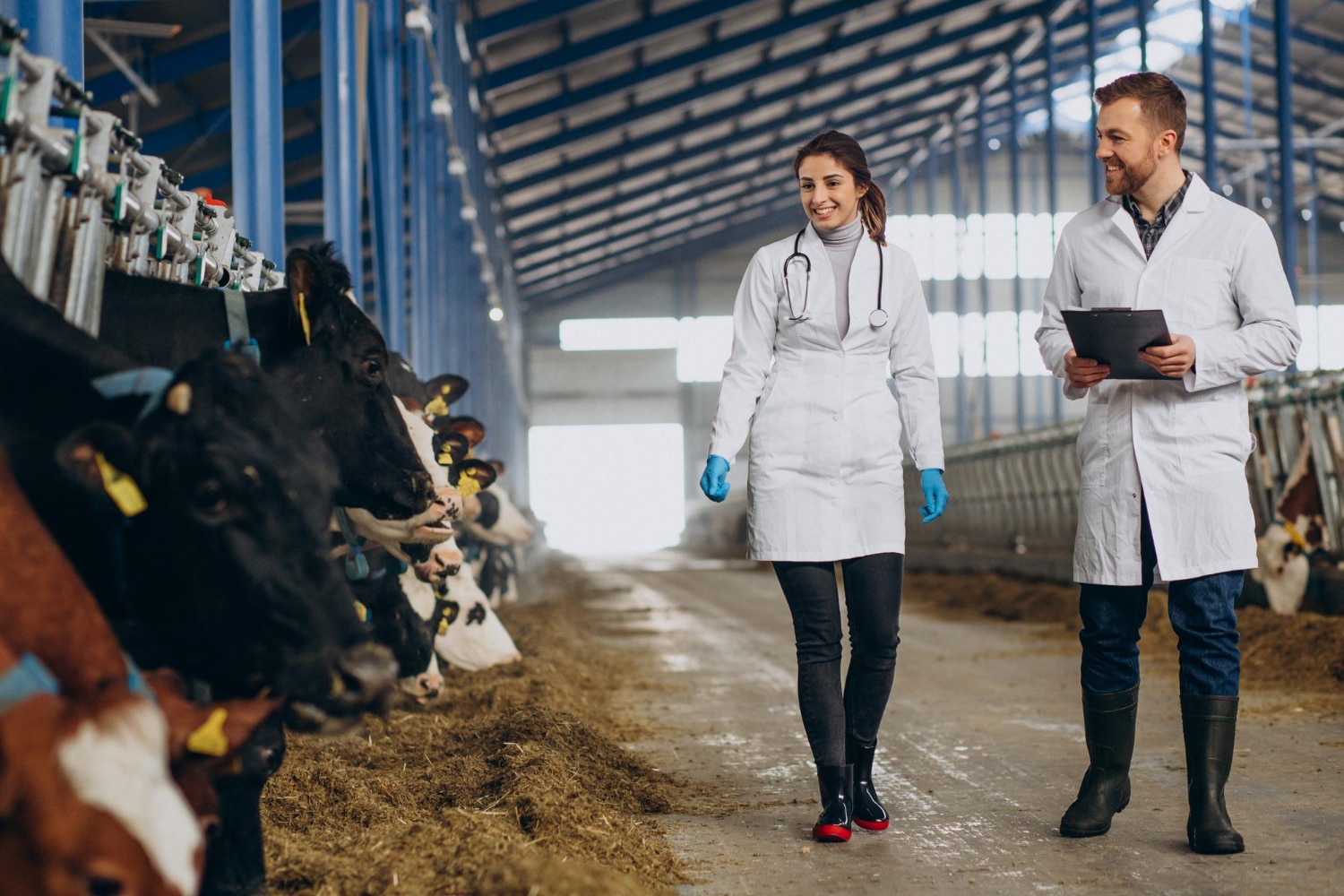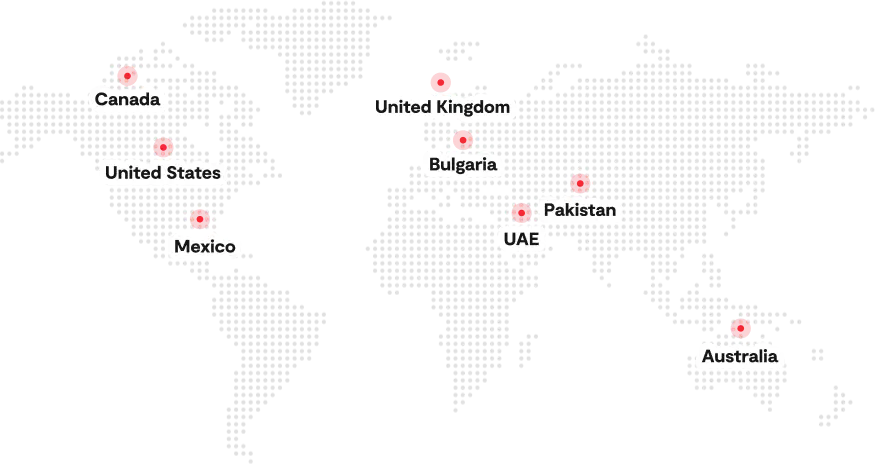Technology integration in modern farming has become a cornerstone of sustainable and efficient agricultural practices. Today’s farmers use agriculture software to optimize operations, streamline management processes, and make data-driven decisions.
With the growing need for automation and real-time insights, these software solutions enable farmers to tackle challenges such as climate variability, labor shortages, and resource optimization. Selecting the right agriculture software can be transformative for farms of all sizes.
From improving productivity to fostering sustainable practices, choosing the best solution is crucial for modern farming success. Below, we explore the top agriculture software development companies leading the industry in 2025.
Criteria for Selecting the Best Agriculture Software
Choosing the right agriculture software can significantly impact a farm’s efficiency and productivity. However, with a wide range of solutions available, it’s essential to evaluate software based on specific criteria.
Factors such as farm size and type, and key features like precision farming tools, financial management, and data analytics should be carefully considered to ensure the software aligns with the unique needs of your farming operations. Additionally, the ability to customize and integrate the software with existing systems is crucial for long-term scalability and success.
Farm Size and Type
The software solution must align with the farm’s specific requirements, whether it’s a small organic operation, a large-scale commercial farm, or livestock management. For instance, precision agriculture tools may be more relevant for large-row farms, while smaller farms may need a simplified, cost-effective solution.
Key Features to Look For
- Precision Farming Tools: Technologies like GPS and IoT enable more precise farming practices, ensuring optimal resource use.
- Farm Management Capabilities: Effective management tools help track activities such as planting schedules, machinery maintenance, and labor.
- Financial Management and Budgeting: Software that can track expenses, generate financial reports, and provide budget insights is essential.
- Data Analytics and Real-time Monitoring: Advanced analytics enable farmers to monitor soil health, crop progress, and yield predictions in real-time.
- IoT and Sensor Integration: Smart sensors and IoT technologies allow farmers to automate processes like irrigation and monitor livestock health.
Customization and Integration
Customizable solutions that can adapt to specific farm needs and integrate with existing ERP or CRM systems are vital for ensuring scalability and ease of use.
Top 7 Agriculture Software Companies for Farmers in 2025
Software solutions have become integral to farm management and operational efficiency as technology reshapes the agricultural landscape. From precision farming to financial planning, agriculture software helps farmers make data-driven decisions, optimize resources, and increase yields.
In 2025, several leading companies are pushing the boundaries of innovation with tools that address the challenges farmers face today. This list highlights the top 7 agriculture software companies, each offering cutting-edge technology to help farmers improve productivity, streamline workflows, and adopt sustainable practices.
1. Folio3 AgTech
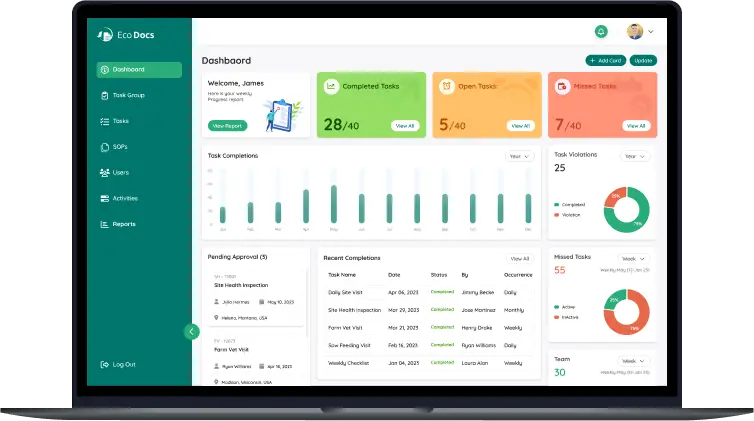
Folio3 AgTech is a leader in providing comprehensive software solutions for modern farms. Its cutting-edge technology is designed to handle everything from livestock monitoring to crop management. What sets Folio3 apart is its deep integration with AI, IoT, and cloud-based solutions, making it a perfect choice for scalable farming.
Key Features:
- AI-driven insights for decision-making.
- IoT and cloud-based tools for real-time monitoring.
- Specialized ERP and CRM systems tailored for agricultural needs.
Folio3’s commitment to helping farmers achieve operational efficiency and sustainable growth is well-documented. Success stories from clients highlight how Folio3’s solutions have revolutionized their farm management practices.
2. Trimble Ag Software
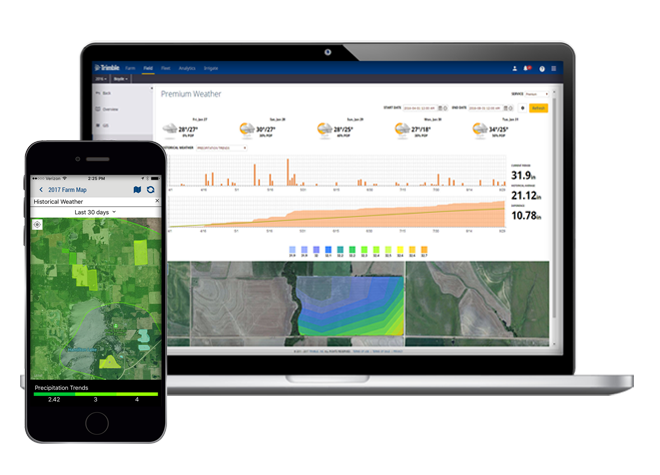
Trimble offers a robust suite of tools for precision farming, fleet management, and farm analytics. Trimble’s solutions help farmers optimize their workflows and enhance productivity, whether managing small or large farms.
Key Features
- Precision agriculture tools for crop monitoring.
- Fleet management for efficient farm machinery use.
- Real-time data collection for actionable insights.
3. Conservis
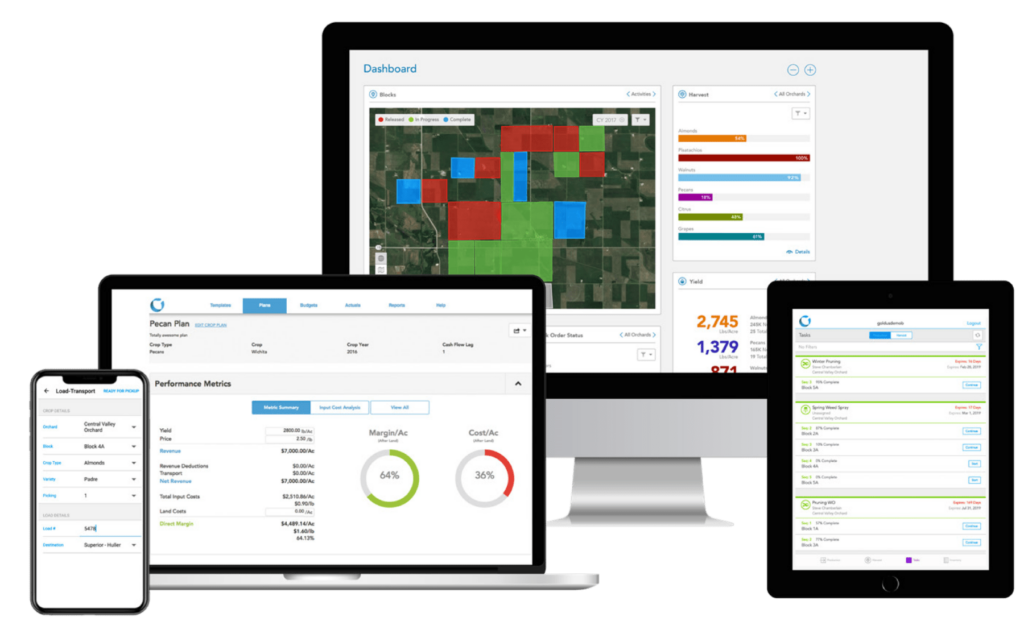
Conservis specializes in farm data management, offering tools for crop planning, yield forecasting, and work order management. It’s an excellent choice for row farming, with features that simplify operational workflows.
Key Features
- Crop planning and resource management.
- Detailed work order and task management.
- Integrated data tools for informed decision-making.
4. Ag Leader Technology
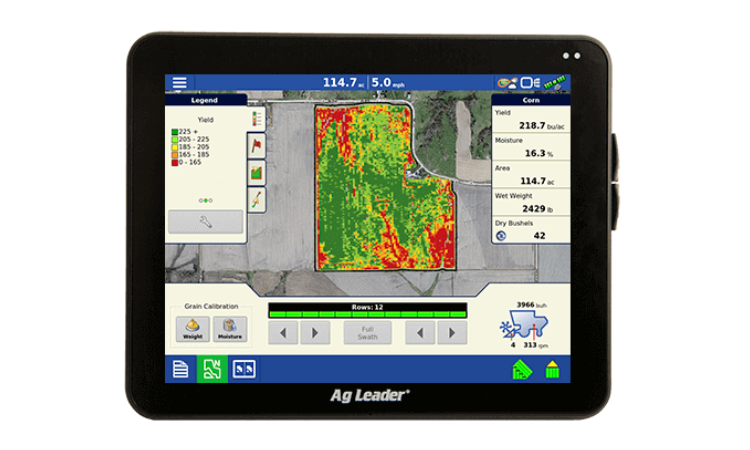
Ag Leader Technology has made a name for itself with its GPS-based precision farming systems. Ag Leader helps farmers boost yields by making data-driven adjustments, from variable rate technology to advanced field mapping.
Key Features
- GPS-based field mapping.
- Precision farming technology.
- Variable rate tools for resource optimization.
5. FarmLogs
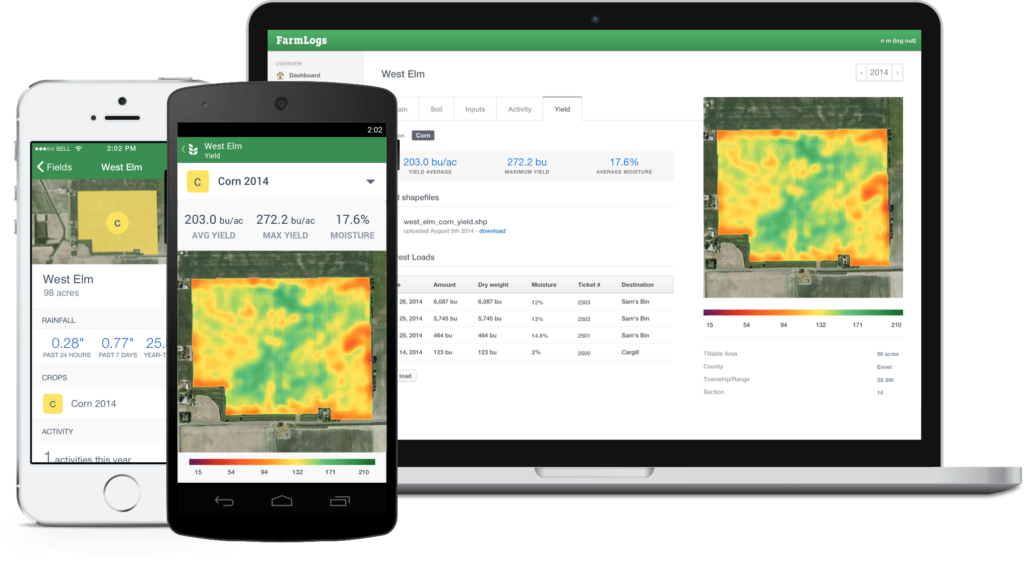
FarmLogs is an affordable and user-friendly solution for small—to medium-sized farms. Its tools include field mapping, weather monitoring, and crop health tracking, making it a comprehensive option for budget farmers.
Key Features
- Easy-to-use field mapping tools.
- Real-time weather data.
- Cost-effective farm management features.
6. Agworld
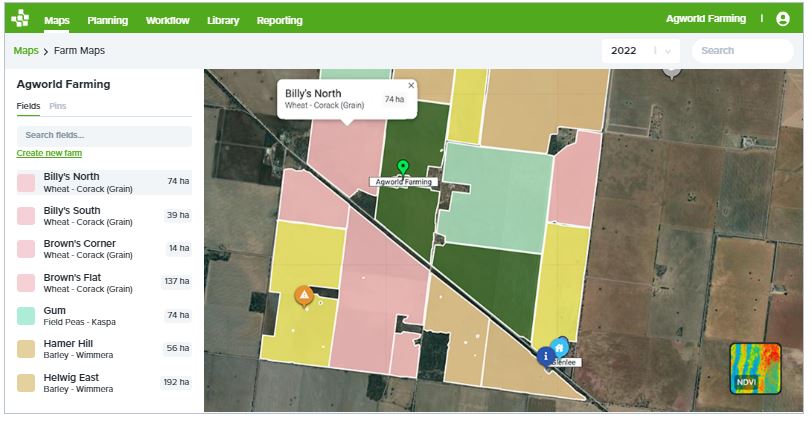
Agworld stands out as a collaborative platform farmers, retailers, and advisors use. The platform offers tools for in-season planning, execution, and monitoring, making it a leading choice for agricultural transparency and accountability.
Key Features
- In-season crop management tools.
- Collaboration between retailers and farmers.
- Advanced data analytics for operational oversight.
7. Croptracker
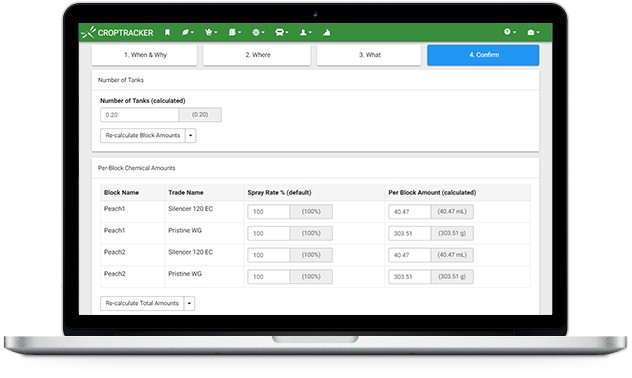
Croptracker offers a robust suite of crop management tools, including compliance record-keeping, crop health tracking, and sensor integration. It’s trendy among farmers who need complete visibility into their crop cycles from planting to harvest.
Key Features
- Compliance and record-keeping for regulatory requirements.
- Sensor integration for real-time crop monitoring.
- Comprehensive crop management tools.
Emerging Trends in Agriculture Software for 2025
The agriculture software landscape is evolving rapidly, driven by the need for more sustainable, efficient, and productive farming practices. In 2025, several key technological trends are set to transform how farmers manage their operations.
From artificial intelligence (AI) and the Internet of Things (IoT) to cloud computing, these innovations are helping farmers address challenges like climate change, labor shortages, and resource constraints. Here are the top emerging trends in agriculture software for 2025:
1. AI and Machine Learning – Revolutionizing Farm Decision-Making
Artificial Intelligence (AI) and machine learning have become indispensable tools for modern farmers, enabling them to process vast datasets and make predictive decisions. AI-powered algorithms analyze real-time data from various sources, such as satellite imagery, sensors, and weather reports, to offer insights into crop health, pest outbreaks, and yield forecasts.
- Crop Health Management: AI algorithms can detect diseases or nutrient deficiencies by analyzing plant health through imagery data.
- Weather Prediction: Advanced AI models now predict weather patterns with increased accuracy, helping farmers decide the optimal times for planting, irrigating, and harvesting.
- Pest and Weed Control: AI-driven systems, combined with drone technology, can detect pest infestations and weeds early, enabling precise and minimal pesticide use. This reduces input costs and supports environmentally friendly farming.
2. IoT and Sensor Integration: Precision Agriculture in Real-Time
The Internet of Things (IoT) has become the backbone of precision agriculture, offering real-time monitoring of various farming operations. IoT devices, such as soil moisture sensors, drones, and livestock tracking collars, provide farmers with critical data for making informed decisions.
- Soil Monitoring: IoT sensors embedded in the soil can track moisture levels, pH, and nutrient content. This data allows farmers to optimize irrigation, prevent water wastage, and ensure that crops receive nutrients. According to MarketsandMarkets, the smart agriculture IoT market is projected to grow from USD 11.4 billion in 2021 to USD 18.1 billion by 2026 at a CAGR of 9.8% from 2021 to 2026.
- Livestock Health Tracking: Wearable sensors for livestock monitor vital signs, movement, and feeding patterns, helping farmers detect health issues early. This reduces veterinary costs and increases productivity, as healthier animals produce better yields, such as milk or meat.
- Irrigation Automation: Smart irrigation systems powered by IoT optimize water use based on real-time soil conditions and weather data, reducing water usage by up to 40%, according to the U.S. Department of Agriculture (USDA).
3. Sustainability Features – Enhancing Eco-Friendly Farming
As the world faces growing environmental challenges, sustainability has become a priority in agriculture. Software companies are integrating features that promote eco-friendly farming practices, enabling farmers to use resources more efficiently while reducing their environmental footprint.
- Water Management: With water scarcity becoming an issue in many regions, sustainable water management tools are essential. Agriculture software can now integrate IoT data to provide precision irrigation, helping farmers use just the right amount of water. According to the World Bank, improved irrigation techniques can reduce water consumption in agriculture by 15-20%.
- Fertilizer Optimization: AI-powered software tools analyze soil data and recommend optimal fertilizers, minimizing over-application and reducing chemical runoff into nearby ecosystems. Research by the FAO indicates that optimized fertilizer application can reduce the use of chemicals by 30-40% while maintaining crop yields.
- Energy Efficiency: As the push for carbon-neutral farming intensifies, agriculture software integrates energy-saving technologies. IoT devices monitor energy consumption and suggest optimizing machinery use, reducing fuel and electricity consumption by 10-15%.
4. Cloud-Based Solutions – Accessibility and Collaboration in the Digital Age
Cloud computing has made farm data more accessible, enabling farmers to store, manage, and analyze data from anywhere. In addition, cloud platforms foster collaboration between farmers, agronomists, advisors, and retailers, providing a unified view of operations across various devices.
- Remote Farm Management: Cloud-based platforms allow farmers to manage their operations remotely, whether in the field or on the other side. This level of flexibility is crucial for large-scale operations or farms spread across different locations. According to a report by Gartner, the global cloud computing market in agriculture is expected to reach $4.4 billion by 2025.
- Data Security and Backup: The cloud provides secure and automatic backups for farm data, ensuring that vital information on crops, finances, and equipment is protected from data loss due to hardware failures or natural disasters.
- Collaboration Tools: Cloud platforms enable real-time collaboration between stakeholders in the supply chain. Farmers can share data with consultants, agribusiness advisors, and retailers to make faster decisions, improving productivity. Software like Granular or Conservis offers such collaborative features, boosting efficiency by up to 20% through better communication and shared data access.
Why Folio3 AgTech Stands Out?
Folio3 AgTech’s custom solutions for farmers are designed to adapt to individual needs. Whether it’s managing livestock, seed inventory, or crop cycles, Folio3’s software offers unmatched customization and integration capabilities.
By blending AI, IoT, and ERP/CRM systems, Folio3 provides farmers with a holistic solution for improving productivity, reducing costs, and promoting sustainability. Its innovative approach ensures farmers have the tools to optimize their operations and stay competitive in an evolving agricultural landscape.
- Custom Solutions: Tailored software for managing livestock, seed inventory, and crop cycles, designed to meet specific farm needs.
- AI and IoT Integration: Advanced AI and IoT technologies provide real-time insights and predictive analytics for smarter farming decisions.
- ERP/CRM Compatibility: Easy integration with ERP and CRM systems, ensuring streamlined farm management and data consistency.
- Scalability: Scalable solutions that grow with the farm suit small, medium, and large-scale operations.
- Sustainability Focus: Tools to optimize resource usage, reduce waste, and promote sustainable farming practices.
Conclusion
Selecting the right agriculture software is crucial for enhancing farm productivity, improving resource management, and staying competitive in an increasingly data-driven industry. The top 7 agriculture software companies for 2025 offer a range of innovative solutions, from precision farming and real-time monitoring to financial planning and sustainability features.
Whether running a small family farm or managing large-scale operations, these platforms provide the tools to streamline workflows, reduce costs, and promote sustainable practices. Adopting these cutting-edge solutions will ensure long-term success in modern farming as technology evolves.
FAQs
What is Agriculture Software?
Agriculture software helps farmers manage various aspects of farm operations, including crop management, financial planning, and precision farming.
Why is Precision Agriculture Important?
Precision agriculture allows farmers to optimize resource use, improve yields, and reduce costs through data-driven decisions.
How Does IoT Benefit Farmers?
IoT devices provide real-time data on soil conditions, weather, and livestock, enabling smarter, more efficient farming operations.

